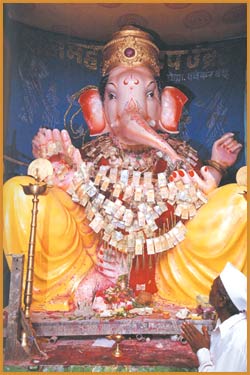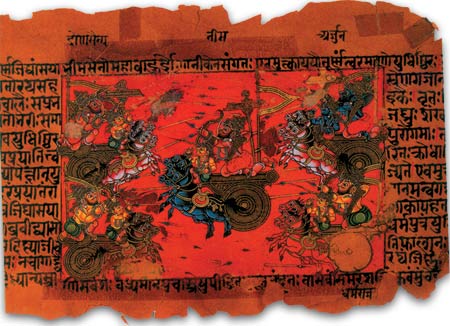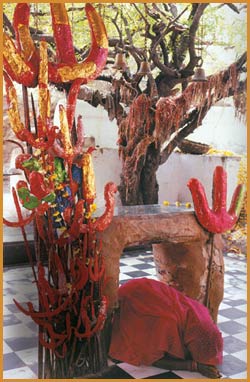
Throughout the Ganesha Chaturthi Festival, Hindus from all over the world compete to show their respect for the false deities the Ganesha. These people, brainwashed by ridiculous Hindu traditions, are unaware of this manifest illogicality.
Our Lord has sent Messengers to every nation who called on their people to believe in Allah. They conveyed to them Allah’s commandments and recommendations and taught them ways of worship. In Hinduism and other false beliefs on the other hand, superstitious practices and traditions developed over the centuries are continue in the form of “pseudo -worship” and under the pretext of loyalty to ancestors. In reality it is superstitious ritualistic idolatry. Hindus believe that this ritualistic worship brings them closer to their gods and that they are doing good which will benefit them in their next incarnation. Surely all these beliefs are a grave error. Allah reveals the situation of people who deny by association in the following way:
… Which are not capable of helping them and cannot even help themselves? (Surat al-A‘raf: 192)
The world of the Hindus is a dark one. Superstitious rituals, idolatrous ceremonies, perverted practices and offerings dominate every moment of the lives of a billion people, preventing them from the peace of believing in Allah, and from experiencing the dignified and happy life prescribed by Him, by keeping them imprisoned in a dark and gloomy world. A Hindu is obliged to follow certain superstitious rituals from birth until death and one of the meanings of the word “Hindu” (darkness) is fairly descriptive of this religion.16
There are over one hundred religious festivals in the Hindu calendar, the examination of which reveals many astonishing, bizarre and irrational practices. For instance, the Naga Panchami festival is dedicated to a god called “eternity snake”. Millions of Hindus, many of whom are well educated, make and mindlessly worship huge snake idols. First, they wash the stone idols with milk and then make offerings of milk and cake to living cobras.17 The Ganesha Chaturthi festival is dedicated to Ganesha, a god represented as half elephant, half man. During this festival, an idol made of clay measuring 8 meters (26 feet) is brought home. For between 2 and 10 days this idol is perversely revered and then caste into the sea or a lake by a large crowd with offerings of coconuts and balls of sweet cakes.18 (According to the so called sacred Hindu scriptures Ganesha is a god prominent with his elephant head and it is believed that he is the son of the gods Shiva and Parvarti, themselves important deities in the Hindu tradition. One day, Parvati cuts Ganesha’s head off by mistake. Saddened by this, Parvati puts the head of the first creature that passes by Ganesha and thus revives him. This idol invariably has offerings of cake and milk before him.) The Hindus’ superstitious love and reverence for their deities is an act of ignorance committed by the deniers by association. Allah reveals:
Some people set up equals to Allah, loving them as they should love Allah. But those who have faith have greater love for Allah. If only you could see those who do wrong at the time when they see the punishment, and that truly all strength belongs to Allah, and that Allah is severe in punishment. (Surat al-Baqara: 165)

It is impossible for these idols that Hindus prostrate themselves in front of, show great respect for, and carry on their backs to hear their pleas or answer their prayers.
The few examples of the superstitious rituals cited above serve to expose the irrational aspects of the Hindu religion. Those who consider Hinduism as a so-called “religion of spiritual freedom and salvation” are in a great error as the myths of the superstitious Hindu faith force people to blindly follow a system of traditions without having a rational basis for them. The Hindu religion has made an educated, civilized and cultured people prostrate themselves before cows and obliges them to make food offerings to stone idols.
Accepting and practicing the traditions of their ancestors without questioning them rationally or conscientiously has been one of the greatest predicaments afflicting pagans throughout history. Allah reveals this type of bigotry in the Surah Luqman:
When they are told: “Follow what Allah has sent down,” they say, “No, we will follow what we found our fathers doing.” What! Even if satan is calling them to the punishment of the Blazing Fire? (Surah Luqman: 21)
Islam on the other hand invites people to follow the only absolute and permanent truth in the universe, Allah’s revelation instead of superstitious traditions. People who enter Islam abide in Almighty Allah, He Who created them and all the universe, and His revealed book of guidance, and not some culture created by people at a certain time in history. Islam, the true religion of Allah, frees people from superstitious beliefs, myths, nonsensical traditions and unquestioned social rules. It calls a person only to abide and live by Allah’s rules and His infinite wisdom which is the only way to find happiness and salvation as Allah, Who made this religion and created man, knows every need of man’s soul and body, its weaknesses, necessities and remedies. Allah has chosen Islam as the religion for us, the people He created. Since the beginning of time, Allah has taught this religion to people through His messengers such as the Prophets Noah (pbuh), Abraham (pbuh), Moses (pbuh) and Jesus (pbuh) and revealed it again to us through his final messenger the Prophet Muhammad (may Allah bless him and grant him peace). That is why Allah says: “…Today I have perfected your religion for you and completed My blessing upon you and I am pleased with Islam as a religion for you” (Surat al-Ma’ida: 3)

The superstitious beliefs of Hinduism contain a number of possibly lethal irrational aspects. In the picture, for example, the woman lying on the ground has been diagnosed with brain cancer. However, she imagines that a cure may lie in the hands of Mariamman, one of their so-called goddesses. Yet it is impossible for that idol either to hear the patient’s complaints or to cure her disease. It is Allah, the Lord of the world, Who bestows both sickness and health.
A great many of the imaginary deities of Hinduism are described in written texts as angry, hate-filled idols that perpetrate great slaughter and delight in inflicting suffering. Kali, who is shown slicing up the body in the picture, is, according to Hindu tradition, an imaginary goddess who delights in slaughter. Hindus describe Kali with the titles of “protectress” or “educator,” and heretically believe that new-born children can partake of her power.
The true faith sent down by Allah purges believers of all irrationality, pessimism, idol-worship and nonsense. Hinduism, on the other hand, imprisons its believers in a bigoted world that depresses the spirit and represses the mind. The perverted rituals of Hinduism once again demonstrate this fact.

Ceremonies, festivals and rites devoted to various deities play an important part in the lives of Hindus. Every festival has its own rituals and its rites that need to be observed. At the Bhima Puja Festival, for example, Bhima shapes are made out of the mud of the River Ganges. Hinduism, which is almost a religion of rites and rituals, encourages Hindus to live empty, aimless and superstitious lives. There is no doubt that the losses they will suffer in the hereafter will be enormous.

Saçma Hindu inanışlarına göre bir böcek, solucan ya da ağaç Ganj Nehri'nin yanında öldüğünde, nehrin suyuna düşerse bir sonraki hayatında Hindu kastlarının en üstü olan Brahman olarak dünyaya gelir.
The River Ganges occupies a very important place in the Hindu religion. It is imagined that a Hindu who washes in the Ganges will be cleansed of all his sins. Because of that belief, elderly Hindus spend their time near the potentially lethally polluted waters of the river. Why is this river regarded as sacred? How does the river take away the sins of those who wash in it? Can someone who commits the most heinous crimes be spiritually cleansed merely by entering and leaving those waters? Hindus prefer not to think about such questions, because a single moment’s thought would reveal how ridiculous this belief actually is. Some of the superstitious Hindu rituals involving the Ganges are:
- Hindus who picture the Ganges and Yamuna rivers in human form use these in the entrances to their temples.19
- In accordance with superstitious tradition, Hindu priests poured 850 liters of milk from silver ewers into the Yamuna, a tributary of the River Ganges, in order to purify it.20
- The Ganges and the Yamuna meet at the city of Allahabad. Hindus hold the superstitious belief that they will be freed from all their sins when they wash at the confluence of these two waterways. Hundreds of thousands of Hindus therefore pour into the region during the year. It is obvious what a facile and nonsensical religion Hinduism is from the way that it links purification from sins to such a meaningless ritual like entering and leaving a river, rather than, as is the case with Islam, repenting, asking for Allah’s forgiveness and committing never to commit the same sins again.
The cruelties that Hindus inflict on the seriously ill also reveal what a dark life this false religion offers. The patient is taken by his friends and family to the River Ganges. Rather than looking for ways of curing his disease, they believe that carrying the patient to the banks of the river is a far more meaningful task. The patient’s worst and filthiest covering is laid over the vehicle in which he is being carried. The patient is then placed on top of it and then left on a rock, supposedly, “to be cured,” but actually to die there. There are many sick people on the brink of death along the banks of the Ganges. Filth and discomfort of all kinds abound here. Everywhere can be heard the sounds of weeping and wailing caused by people’s sicknesses. As death approaches, half the person’s body is immersed in water, and he dies in that position.21 These inhumane practices are literally intended to kill. Many people have lost their lives because of the unhygienic conditions and unhealthy influences all around, even though they had the opportunity to receive hospital treatment. This ritual is literally no different to murder.

Before visiting these false deities, which they call Durga, every morning, Hindus first wash, put on their clothes and adorn themselves with jewelry. If you see someone doing this you may imagine that he has lost his mind. The only difference in Hinduism is that this “loss of reason” has continued as a tradition for thousands of years.
Many Hindus have shrines for their idols in the kitchen or some other room. There are various pictures and symbols there. Every day they offer food, water, incense and light to these lifeless statues, which have no will or power of their own. There is no difference between this and offering food to anything in your room, such as a chair or a table.

Deviant rituals are scrupulously observed in every Hindu household. Even if the household shrines differ, what goes on in them never changes. People who have been brainwashed with superstitious teachings pray for hours to their hand-made idols and persist in the error that these can be of benefit to them.

Hindus also believe that plants, created by Allah and with no special powers, are sacred. Indeed, for them all living things are sacred. In their view, groves are abodes of the gods. They have invented homes for these imaginary “gods” of their own invention. The small picture shows a shrine made inside a tree for their supposed deity Durga. Hindus also regard the tulsi plant, a kind of basil, and the pipal tree as sacred. Trees such as the pipal are worshipped every day, some every month, and others during special festivals. According to Hindu legends, the tulsi was once the beloved of the imaginary deity Vishnu. Another fictitious deity, Lakshmi, then became jealous and turned her into a tree.22
This nonsense, made up thousands of years ago by someone whose name is unknown, is still believed in by Hindus.
Hindus also believe that trees are inhabited by spirits. As a result of this completely irrational idea, tree-worship is quite widespread among Hindus. They constantly offer food to these so-called tree gods, and worship and pray to them by tying shreds of clothing to their branches and placing red-painted stones at their bottom. The Hindu in the picture is paying his respects before this pipal tree that his people worship. None of them ever wonders whether or not the trees hear them, or whether or not there really is a spirit that can hear them in the tree. They never receive any response to their prayers. Nonetheless, they continue to perform this ritual, solely because their forbearers did so.

Hindus make a terrible mistake by imagining that they will be rewarded for the offerings they make to the trees. The fact is that those who regard lifeless entities as equal to Allah will find themselves helpless, friendless and utterly alone in the hereafter.
Our Lord has sent forth a messenger to every nation to guide them to salvation. Messengers lead their nations by the word of Allah, He Who has created the universe out of nothing and knows the truth of everything. Allah revealed the Torah to the Prophet Moses (pbuh) the Psalms to the Prophet David (pbuh) and the Gospel to the Prophet Jesus (pbuh). The source of Islam is the holy book of the Qur’an, revealed to our Prophet Muhammad (may Allah bless him and grant him peace) by our Lord. Allah reveals in the Qur’an that the Torah, Psalms and the Gospel have been tampered with and falsified by people since their revelation, but the Qur’an has reached us exactly as it was revealed to our Prophet (may Allah bless him and grant him peace). Allah says: “It is We Who have sent down the Reminder and We Who will preserve it.” (Surat al-Hijr: 9)
The Qur’an was revealed for us to read, to understand and to learn from, to get to know our Lord, He Who has created the universe out of nothingness, and to know how to serve Him and to respect His limits. Allah explains His verses by many examples and narratives. As Allah reveals with the following verse, the Qur’an is complete and faultless: “... We have not omitted anything from the Book.” (Surat al-An‘am: 38). Many details of this life on earth as well as the hereafter are revealed in great detail and in the most befitting way in the Qur’an, and Allah reveals this fact with this verse: “We have sent down to you a Book containing your Reminder. So will you not use your intellect” (Surat al-Anbiya’: 10) The Qur’an is Allah’s word and guidance to salvation for all people. It addresses every human being on earth and covers all eras since it revelation.
Hinduism on the other hand is a sum total of superstitions without divine foundations, produced by certain people thousands of years ago reflecting their false beliefs, narrow-mindedness and ignorance. It therefore defies logic and reason. The scriptures considered to be the Hindus’ sacred books, have been written by the Aryan conquerors of India and various Hindu leaders, and contain myths, tales and pure fantasy. However, Hindus do not wish to acknowledge this fact but chose to consider the Hindu texts, especially the Vedas, as so-called Divine guidance. They persist in regarding the erroneous teachings of these scriptures and their invented, irrational, and illogical tales as infallible guidance. For this reason they consider, according to their own ignorant minds, their dark and gloomy world as the ideal social model of life.

An illustration depicting the Epic of the Mahabharata. This describes a great war that broke out as the result of a struggle for power between two tribes. This fictitious tale, which Hindus regard as being absolutely true but that are in reality irrational and illogical nonsense, portray supposed deities as having superior powers. Krishna, one of the illusory deities to whom Hindus attach the greatest importance, is the fictitious hero of this epic.
Throughout history, many nations persisted in allegiance to the false religions and traditions inherited from their ancestors despite being taught Allah’s true religion:
When they are told, “Come to what Allah has sent down and to the Messenger,” they say, “What we found our fathers doing is enough for us.” What! Even if their fathers did not know anything and were not guided! (Surat al-Ma’ida: 104)
When they are told, “Follow what Allah has sent down to you,” They say, “We are following what we found our fathers doing.” What, even though their fathers did not understand a thing and were not guided! (Surat al-Baqara: 170)
They said, “Have you come to us to turn us from what we found our fathers doing, and to gain greatness in the land? We do not believe you.” (Surah Yunus: 78)
The various branches of Hinduism are based on four books known as the Vedas, the Upanishads, the Puranas and the holy Brahmans. Hindus’ lives, perverse worship, complex beliefs and rituals are all based on these superstitious books. The Brahman, termed to be the “science of sacrifice”, contains detailed descriptions of rules and rituals and is essentially an explanation of the Vedas. Despite the fact that these books are full of contradictions, nonsense and moral perversion, they have become the guiding principles of Hindus.

Hindus generally base their beliefs on the Vedas, written around 1000 BC. The Vedas are regarded as the first written references in Hinduism. They are divided into four: Rig Veda, Yajur Veda, Sam Veda and Atharva Veda. These books contain legends, obscure texts, hymns, sections that describe sacrificial rituals, and chapters about spells and magic. Despite the many inconsistencies, nonsense and moral perversions in them, they have become Hindus basic scriptures.

Sun-worship still goes on in India. The picture shows a Hindu woman worshiping the imaginary sun goddess Surya with peculiar movements. This woman seeks to show her respect for Surya by crawling for hours on her knees. The fact is, however, that it is Allah, Lord of the worlds, Who created the sun and moon from nothing.
Almost the entire content of these scriptures, considered to be sacred by Hindus, are contradictory and nonsensical, which is why it is such a grave and surprising error on the part of the Hindus to adopt these texts as guiding principles which are strictly adhered to. This chosen, but false, religion brings them much grief in this world. Worshipping their deities for days, even months on end, praying to their idols in shocking rituals and all their other efforts made in this respect will not benefit them in any way. Unless they abandon this mistake of theirs, our Lord’s revelation will bring everything the idolaters do to naught. (Surat al-An‘am: 88)

Do they make things into partner-gods which cannot create anything and are themselves created; (Surat al- A‘raf: 191)
16. Firuz Al Lughat (Lahore) s. 615. Lughat Saidi, (Kanpur) s. 633. Murtahin Billah Fazlie, Hinduism and Islam, A Comparative Study, Islamic Book Service, New Delhi, s.17
17. Korhan Kaya, Hinduizm, Dost Yayınevi, Şubat 2001, Ankara, s. 50
18. Korhan Kaya, Hinduizm, Dost Yayınevi, Şubat 2001, Ankara, s. 51
19. Korhan Kaya, Hinduizm, Dost Yayınevi, Şubat 2001, Ankara, s. 63
20. "Hinduizm", http://dunyadinleri.kolayweb.com/Hinduizm.html
21. William Joseph Wilkins, Modern Hinduism, London 1975, s. 376
22. Korhan Kaya, Hinduizm, Dost Yayınevi, Şubat 2001, Ankara, s. 64